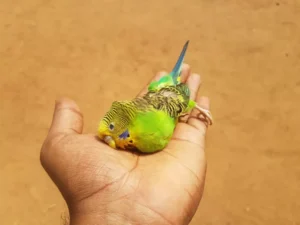When a budgie is dying, it is important to provide comfort. This can be done in a variety of ways, depending on the situation. If the budgie is sick, and you are providing hospice care, you will want to make sure the budgie has a quiet, comfortable place to rest.
You may also want to offer soft food or water through a syringe if the budgie is too weak to eat on its own. If the budgie is injured, you will want to keep it calm and warm until it can be seen by a vet.
In all cases, gentle handling and soothing words can help comfort a dying budgie.
First, it is important to provide your budgie with a calm and quiet environment. This will help them to feel more relaxed and at ease.
Next, you will want to offer your budgie some soft foods that are easy to digest. Budgies typically enjoy foods such as mashed fruits or vegetables, baby food, or moistened pellets.
You can also offer your budgie some water through a syringe or dropper. This will help them stay hydrated and comfortable during their final days.
Finally, it is essential to spend time with your budgie and provide them with love and companionship. Budgies are social creatures and often find comfort in being around those they know and trust.

How Do I Comfort a Dying Bird?
When a bird is dying, it is important to provide comfort and support. This can be done in a number of ways, including:-
- Talking to the bird in a soft, reassuring voice
- Offering it food or water (if it is able to eat or drink)
- Keeping it warm with blankets or a heat source -Providing it with a quiet, safe place to rest
- Putting it in darkness if it seems scared or agitated. If you are unsure of how to care for a dying bird, it is best to consult with a veterinarian or experienced wildlife rehabilitation.
These professionals can help you make sure the bird receives proper care and has the best possible chance of surviving.
What Happens When a Budgie is Dying?
When a budgie is dying, there are several things that happen.
First, the budgie will stop eating and drinking. This is because their body is shutting down and they no longer have the energy to eat or drink.
Next, their breathing will become shallow, and they may start to pant. This is because their body is having trouble getting enough oxygen.
Finally, their heart rate will slow down, and they may become very lethargic. They may also start to sleep more than usual.
How Do You Revive a Budgie?
If you have a budgie that seems to be unresponsive, there are a few things you can do to revive them.
First, check their crop to make sure it is not impacted. If it is, you will need to manually remove the blockage.
Next, check for any injuries and treat accordingly.
Finally, offer the budgie some sugar water or electrolytes to help them rehydrate. If none of these things seem to work, it is best to take the budgie to a veterinarian as soon as possible.
12 Tips For Treating a Sick Budgie
Symptoms of a Dying Budgie
It can be difficult to tell when your budgie is sick or dying. However, there are some common symptoms that you can look out for. If your budgie is lethargic, has lost its appetite, or is having difficulty breathing, these may be signs that it is not doing well.
If you notice any of these symptoms, it is important to take your budgie to the vet as soon as possible. Additionally, if your budgie’s feathers are ruffled, or it seems generally unwell, these could also be signs that something is wrong.
If you think that your budgie may be dying, it is important to seek veterinary care immediately.
This will give your budgie the best chance of getting the treatment it needs and potentially recovering. It can be heartbreaking to lose a pet, but by being aware of the signs of a dying budgie, you can help ensure that your beloved companion gets the care it requires in its final days.
Conclusion
When a budgie is dying, it is important to comfort them and make sure they are as comfortable as possible. This can be done by providing a soft perch for them to rest on, keeping them warm, and making sure they have access to water.
It is also important to spend time with them and talk to them so they know they are not alone.